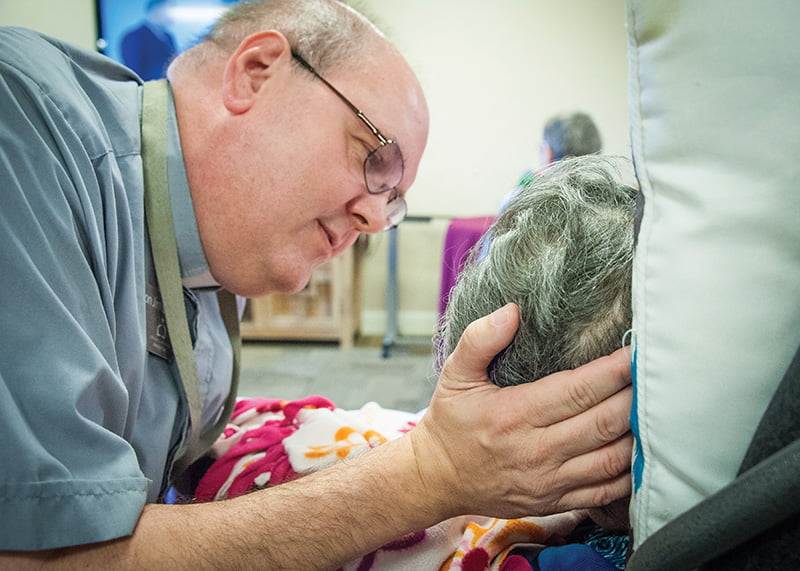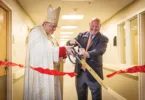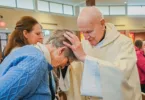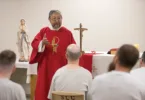
Deacon Jim Lavin offers comfort to hospice patients at Villa St. Francis in Olathe. Deacon Lavin serves as a chaplain with Catholic Community Hospice, a ministry of Catholic Charities of Northeast Kansas. Despite the nature of his work, he finds his ministry very rewarding. LEAVEN PHOTO BY LORI WOOD HABIGER
by Steve Buckner
Special to The Leaven
OLATHE — Deacon Jim Lavin slowly and considerately approaches an elderly, wheelchair-bound woman at Villa St. Francis here.
He says her name, looking for a glint of recognition in her eyes. Finding none, he sits beside her anyway, talking softly so that only she can hear him. He finishes with a prayer, gently touches her shoulder and says his goodbyes — for now.
He moves on and deliberately repeats this delicate process with four other patients.
Deacon Lavin serves as a chaplain with Catholic Community Hospice, a ministry of Catholic Charities of Northeast Kansas. On this day, he has 22 patients and their families to look after and console. The day before, he had 25, but three patients died overnight. He has been on the job since Feb. 1, having previously worked for the archdiocese as a web specialist.
A friend recently asked him how he liked his new duties.
Deacon Lavin said simply, “I love it.
“Then I thought about that afterward and realized that sounds strange,” he added, “because it sounds like you enjoy hanging out with the dead and the grieving.
“But in a sense, I love it because it’s a ministry. It’s important ministry work — and I can be a messenger of hope in the faith to so many people who need it at this time.”
Deacon Lavin is one of three chaplains of Catholic Community Hospice. The others are Sister Judith Jackson of the Sisters of Charity of Leavenworth, and Tracy MacClement, a Presbyterian minister. All three chaplains serve patients of all faiths, not only in Kansas, but in Missouri, which does not have a Catholic hospice.
How hospice works, part one
Hospice represents a type of care that a patient chooses when he or she has a long-term, life-threatening illness and no longer wants to go through aggressive treatments, Deacon Lavin said. To qualify for hospice services, a doctor has to certify that the patient has less than six months to live and that he or she has a disease or a condition that will result in continued decline.
“We want to make them, above all, comfortable — free of anxiety and agitation as much as possible,” he said, “and to give them the best quality of the life they have left.”
And, Deacon Lavin added, we work to help both the patients and their families “be spiritually prepared for this.”
“We have social workers, case managers, nurses and home health aides who come in and help bathe the patient, trim fingernails, fix hair and groom the patient,” he continued.
Music and massage therapy are also available. The patient can decline any of the services that are provided.
But the spiritual part is an integral part of all the services, Deacon Lavin said.
“We’re not fighting the disease anymore,” he said. “We’re fighting the fear and resignation that sometimes comes when facing the end of life.”
Catholic Community Hospice provides hospice care at no cost to the patient because of coverage by Medicare, Medicaid and many insurances, Deacon Lavin said. Some other hospices work on a for-profit basis, he noted.
Because of this emphasis on both the patient and the family, Deacon Lavin said, a bereavement coordinator will stay in contact with family members up to a year or longer after the patient has died.
How hospice works, part two
The process for Deacon Lavin begins when he gets notified he has a new patient. The patient might be homebound or in a facility, such as Villa Saint Francis, or a hospital.
It may be someone who is not expected to live more than a few more days. He’s had a patient for less than eight hours. Depending on their cognitive level, his ability to communicate with them can be challenging.
“I meet with the family in person or call them to get more information about the patient,” Deacon Lavin said. “One of the things that Sister Judith taught me was to minister in a way that is meaningful to them.
“We serve people of all faiths — or no faith. There’s a reason the family chose Catholic Community Hospice. So, one thing I do is minister in a way that is meaningful to them.”
If they are Catholic, Deacon Lavin determines if they have a favorite devotion, like the rosary, the Divine Mercy chaplet or other special prayers. He also contacts a priest if they need the sacrament of the anointing of the sick. If they are Protestant, he finds out if they would be willing to pray with him or would like a visit from their own minister.
“Sometimes, I coordinate that,” Deacon Lavin said. “Same with priests. I’ve called some priests and had them come anoint the patient.
“If the patient has little or no faith, I still want to minister in a way that is meaningful to them, which is called being a minister of presence. Being there. Being social, talking about things they can relate to, holding their hand, but respecting their faith, their affiliation and background.
“We don’t proselytize,” said Deacon Lavin. “But if they’re Catholic, we touch on faith, hope and love.”
Catholic Community Hospice recently held its annual memorial service, which is for all the patients who have died in the previous year.
“All the loved ones are invited,” Deacon Lavin said. “It’s not a Mass, but it’s a powerful, moving service to help with closure and to remind the family that they are not alone, that they are loved and that we’re all in this together.”






